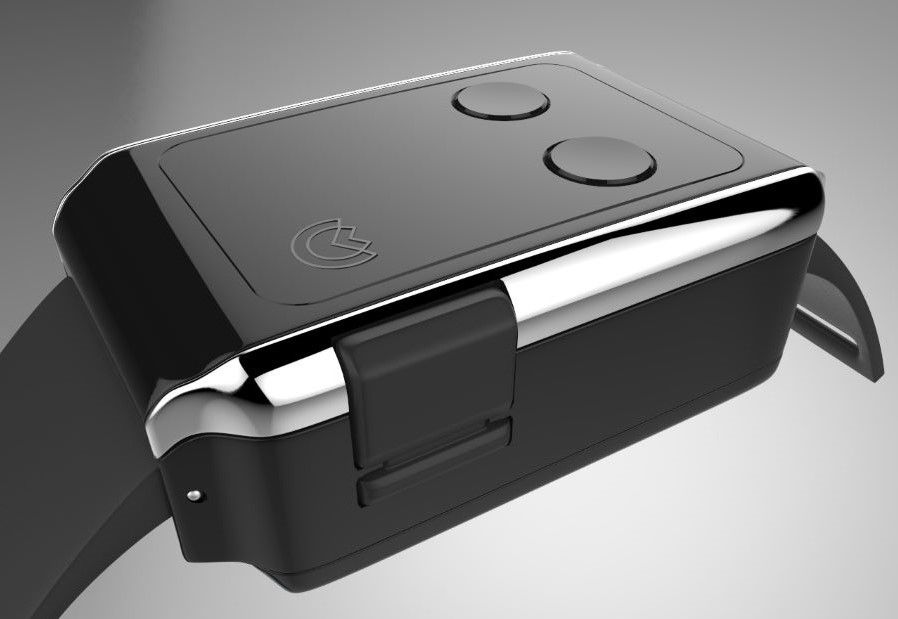The Tunisian invention bringing hope to epilepsy sufferers

Millions of epilepsy patients across the Arab world are in daily danger of suffering a potentially fatal seizure, with multiple factors influencing when an attack might strike. The condition’s unpredictability makes it tough to manage and a quick response from caregivers is vital, so a trio of 20-something Tunisian entrepreneurs have created a high-tech bracelet that automatically alerts friends and family that a seizure has happened.
“Usually, people who have seizures don’t know when one is going to strike – we could see the problem and wanted to use technology to create a solution,” says 25-year-old Haroun Moula, co-founder and chief operating officer of Tunis-based Epilert. The sister of fellow co-founder Firas Rhaiem, 25, suffers from epilepsy, which inspired the two schoolfriends and third co-founder Amine Riahi, 26, to act. Together, they launched Epilert in mid-2017 with just a few hundred dollars, recruiting unpaid graduates and students to work for the company in return for a stake in the firm, while the company also formed a partnership with a Tunis university medical school.
“The first challenge was to make our engineers aware of the medical and scientific background of epilepsy in order for them to better understand the disease so that we could design an optimal solution,” says Moula. “Our research led us to decide on a bracelet because it’s easy to wear and use and isn’t stigmatising.”
A seizure puts the epilepsy sufferer in danger, not only from the attack itself, but from harm caused if they were to fall: every year, one in 1,000 people with epilepsy die from a seizure, according to the US Epilepsy Foundation.
“Imagine if a seizure were to happen when someone is in the shower or riding a bike,” says Moula, a computer engineer.
THE TECH
Epilert’s bracelet monitors a patient’s heartbeat, temperature, neurological activity and other physiological data. It will recognise a wearer is having a seizure within 30 seconds of a fit starting, automatically contacting the person’s caregivers, which are registered on the patient’s account on the Epilert app.
The bracelet will provide info to caregivers as the severity of the seizure, which is usually measured by the seizure length, as well as the patient’s exact location. The alerts can be delivered via SMS or automated phone call.
The bracelet, which syncs to the wearer’s smartphone via Bluetooth, can predict when a seizure is probable.
“If a patient is able to know a seizure is likely, they can ensure they’re in a safe environment,” says Moula. “Our added value is in the signal processing of the data, especially the neurological data, which isn’t something that you can find on other devices.”
As well as automatically collecting physiological information including wearers’ sleep patterns, users can add other important data to their profile such as their age, sex, weight and height. They can also log other data such as their most recent meal - the time and type of food – and emotional status, which can all influence the likelihood of a seizure and its severity.
“The idea is to use the app as an awareness tool and as a tool for the patient to track themselves, logging detailed data to better help the algorithms and the doctors,” said Moula.
There should be a huge market for Epilert’s technology. Ten of the 22 Arab League member states provide no public data on epilepsy, according to a 2016 academic study, but among the 12 members that do provide data, 7.5 people per 1,000 suffer from epilepsy. The combined population of Arab League members is around 420 million, so extrapolating the academics’ data would mean there are around 3.15 million epilepsy suffers in the region.
Epilert is currently conducting preclinical trials of its bracelet and filling for US regulatory approval in order to start selling it in the United States. Moula expects to receive the go-ahead by the end of 2020.
Patients will be able to buy the bracelet directly from Epilert, although the company also plans to partner with doctors specialising in epilepsy in order to boost awareness of the product. The bracelet will cost $150, while a subscription to Epilert’s services costs a further $10 a month.

“The Middle East Exchange” in partnership with Mohammed Bin Rashid Al Maktoum Global Initiatives and the Bill & Melinda Gates Foundation, provides a unique global platform to help frame and stimulate regional and global debate on the vital development issues shaping Arab societies.


